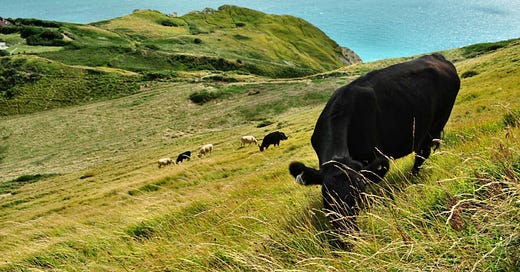Did you know that beef and lamb create outsized greenhouse gas emissions? Like way more than say pork or poultry? Beef is a significant factor in global climate change, accounting for a staggering 14-15% of global greenhouse gases from production, consumption, and waste. It's a surprising and sobering statistic that many people aren't aware of.
(Photo from Viktor Forgacs, Unsplash.)
But why are greenhouse gas emissions so high compared to other meats like pork? The answer lies in the nature of grazing animals. Cattle production is uniquely resource-intensive, requiring massive amounts of land and creating substantial environmental challenges. In the United States alone, about 100 million acres are dedicated to producing feed crops for cattle, including corn, alfalfa, hay, and sorghum.
These emissions come from multiple sources: methane produced by ruminating cattle, the extensive land use, the feed production, and the significant amounts of manure generated. Each of these factors contributes to beef's oversized environmental footprint.
A Personal Climate-Conscious Choice
Project Drawdown provides compelling evidence of more climate-friendly dietary choices.
Motivated by these facts, I made a significant lifestyle change.
I've adopted a Climatarian diet, completely eliminating beef and cow products, including dairy, from my diet. Instead, I've embraced plant-based meals 80% of the time and innovative protein sources.
If going completely plant-based seems daunting, there are still impactful steps you can take.
Red Meat Alternatives
Switching from beef to poultry or fish can significantly reduce your carbon footprint while potentially improving your cardiovascular health. Imagine replacing a typical hamburger with fish tacos – a simple swap with meaningful environmental benefits.
As a heartwarming side note, cows are incredibly sweet animals that even enjoy music! (Though this adorable fact doesn't offset their environmental impact.)
Dairy Alternatives
Plant based milk - soy, oat, pecan, almond, pea are among the most popular. I look for brands without gums and other additives.
Butter - Olive oil, rice bran oil, avocado oil, sunflower oil for cooking.
Pro Tip: I have found that vegan plant-based butter and olive oil work really well in baked good recipes, I swear cookies taste actually better, with a more delicate crunch made with half vegan butter and olive oil in place of butter. We go through a great deal of olive oil in our house, it is an excellent cooking oil, we use rice bran oil, avocado oil, sunflower oil and nut oils sometimes, depending on the recipe.
Vegan Butter for baking- a few brands I like in the US are Earth Balance and Miyoko.
Vegan Cheese - it’s a great time to explore vegan cheeses, new ones are popping onto the market every year.
Protein Alternatives
Tofu, brown rice protein, and pea protein have become some of my go-to options, especially in breakfast smoothies. Not only have I found this switch delicious, but it's also given me a sense of personal contribution to living within planetary boundaries. Favorite smoothie recipe below!
Dragonfuit + Passionfruit Breakfast Smoothie
¼ cup frozen dragonfruit pieces
¼ cup frozen passionfruit pieces (substitute berries, mango, peaches etc as to your preference and what is available in your area)
1 banana
2/3 cup fresh squeezed orange juice,
1 T fresh lemon juice
A pinch of dried turmeric
2 TBSP Organic Brown rice protein (unflavored)
1 TBSP Organic Pea protein (unflavored)
Add all ingredients to blender. Blend for 2 minutes until smooth. Pour and enjoy!
If you want to get fancy (I only do this for special occasions), blend in two batches with half of the ingredients and the passionfruit in one blend and the dragonfruit and the other half of the ingredients in a second batch. Swirl them as you pour them into a clear drinking glass for a purple and orange swirl smoothie. Looks really inviting and delicious this way.
Beyond Greenhouse Gases
The environmental cost of beef extends far beyond greenhouse gas emissions. Water consumption, air and water pollution from cattle production create substantial burdens on surrounding communities. The environmental and social impacts are far-reaching and profound.
A Call to Action
It's time to reconsider beef's place on our menus. Can you imagine reducing your beef consumption? Even small changes can make a significant difference. Recently, I found myself on a Lufthansa flight with only beef or cheesy pasta options – and I chose to decline both. It's a stark reminder of how pervasive beef is in our food systems and how much work we have to do to create more sustainable dining choices.
This isn't about perfection. It's about making conscious choices that support our planet's health. Every meal is an opportunity to make a difference.
Are you ready to change your plate for the planet? Limiting beef and lamb is a great way to start.
About the Author
Gretchen Kish is a sustainability strategist with a deep passion for healthy eating.
In 2023 she made a pivotal career shift from leading social impact initiatives at Meta to working full-time for the planet. As Founder of Climate Innovation Project—a San Francisco-based service design consultancy, she helps organizations reimagine their business models through a sustainability and social impact lens.
As a passionate climatarian committed to reducing greenhouse gas emissions, she actively seeks out new ways to live a planet-friendly lifestyle and is currently working on a cookbook that celebrates planet-friendly recipes.







